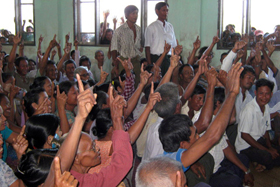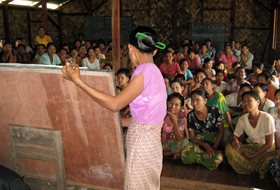Background and Objectives
Background

The damage and destruction estimate following the impact of Cyclone Nargis was 752,000 households across the Ayeyarwady and Yangon Divisions; the housing sector, according to the Cyclone. Nargis devastated over 23,206 households in the coastal township of Kungyangon, damage levels for Kungyangon were categorized as severely affected as per the Periodic Review (2008) exercise conducted by the TCG, with over 91% of all households in the area affected. Efforts by the humanitarian community and international agencies have addressed the needs of approximately 10,505 of these households through some kind of support, either by providing material support, cash grants or a small number of rebuilds. This still leaves a gap of 14,772 houses belonging to the most vulnerable families that are yet to be supported with any type of shelter assistance. Most agencies continue to operate in townships in the Delta whereas UN-Habitat and only a few other agencies operate in Kungyangon.
The Rebuilding Homes - Rebuilding Lives Coastal Settlements Support Programme CSSP with financial support from the New Zealand Government's International Aid and Development Programme (NZAID programme) within the Ministry of Foreign Affairs and Trade aims to support the holistic resettlement of IDP communities across three areas in Kungyangon, who have to date, not received any shelter rehabilitation support. Kha Laut Tayar (185 HH), Pyi Taw Thar (164HH) and Taw Ku West (82 HH), representing a total of 431 households that require support. Some of these houses are cramped and have multiple families residing in them so the estimated number of shelters requiring rebuilding may be greater than 431. These families currently live in makeshift huts precariously constructed from weak, low quality and temporary materials such as bamboo, thatch and tarpaulin roofing, further exposing them to risks in the event of any future disasters. Many of these makeshift huts have been washed away by the previous monsoons. All face acute water and sanitation problems and access to basic services continues to be an issue.
Objectives
The goal of the Rebuilding Homes- Rebuilding Lives - Coastal Settlements Support Programme is to facilitate the communities rebuilding their own homes through self-help people's process. Vulnerable families’ proactively participate in recovery while re-establishing community-based social protection measures; thus community capacity to plan and manage the recovery process is enhanced leading to sustained long-term development.
Activities
* Community Mobilization and field verification of potential beneficiaries prioritized as most-vulnerable
* Formation of Village Shelter Recovery Committees (VSRCs)
* Community Actions Planning (within the villages these VSRs will collaborate with the community in order to select beneficiaries)
* Rebuilding of new shelters and Retrofitting and structural of shelters
* Conduct UN-HABITAT's DRR training and on-the ground demonstrations of rebuilding or upgrading their shelters for selected carpenter, artisans, masons, labourers.
* Construction of individual household latrines and hand-washing units
* Construction/Upgrading of village ponds, bridges and jetties, flood protection embankment
* Upgrading of village access roads and footpaths, manmade navigation canals for boats, drainage/sewer in the village
* Drain Cleaning and excavation of culverts
Results

* 431 families rehabilitated with shelters, ceramic jars with water filters, household latrines and hand washing units
* Over 50 craft men trained on disaster resilient construction practices and provided with toolkits for livelihoods
* 4 ponds constructed/upgraded as water source for Community and nearby villages
* 10,000 Rft of village flood protection embankment dykes constructed 4 bridges/jetties and 4 drainage systems installed or improved
Development Partners / Partners
Development Partners: New Zealand Aid
Partners: UNHCR, land advisor from the SLRD department of the Ministry of Agriculture, Regional Hub Offices of the Recovery Coordination centre (RCC) of the Tripartite Core Group(TCG).
- The Project for Emergency Support to Poor and Vulnerable Communities in Ethnic Areas
- A Short Step from Improved WASH to Healthier Communities
- The Programme for Emergency Assistance to Poor and Vulnerable Community in Ethnic Minority Areas and Yangon
- Safe and Sustainable Access to WASH for Rural Communities
- Shelter Recovery Programme – Post Giri Affected Areas
- Shae Thot ‘The Way Forward’
- Land Administration and Management Programme (LAMP) in Myanmar
- Safer Coastal and Urban Communities through DRR in Myanmar
- Disaster Risk Reduction for Safe & Resilient Burmese Coastal Communities
- The Programme for Development and Rehabilitation of Community in Ethnic Minority Area, Myanmar
- Myanmar Climate Change Alliance (MCCA)
- Rebuilding Homes-Rebuilding Lives – Coastal Settlements Sustainable Recovery (CSSR)
- Rebuilding Homes-Rebuilding Lives – Coastal Settlements Support Programme (CSSP)
- Coastal Communities Livelihood Assistance Programme (CLAP)
- Disaster Response & Preparedness – Resilient Coastal Communities and Urban Risk (DRP-CURB)
- Shelter Improvement and Disaster Risk Reduction Project
- Community Water Supply and Sanitation Recovery
- Community Based Disaster Risk Reduction (CBDRR)
- Support to the Coordination of Early Recovery Shelter Interventions-Shelter Cluster Lead
- Semi-permanent Schools in Ayeyarwady Delta in Myanmar / Multi-purpose Schools in Ayeyarwady Delta in Myanmar






































